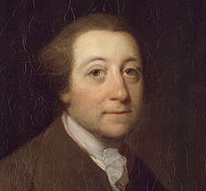William Whitehead (baptized 12 February 1715 – 14 April 1785) was an English poet and playwright. He became Poet Laureate in 1757 after Thomas Gray declined the position.
The son of a baker, Whitehead was born in Cambridge and through the patronage of Henry Bromley, afterwards Baron Montfort, was admitted to Winchester College.
Much of Whitehead's work was well received: his tragedy The Roman Father was successfully produced by David Garrick in 1750, Creusa, Queen of Athens (1754) was also praised and his sentimental comedies The School for Lovers (1762) and The Trip to Scotland (1770) were successful.
After being appointed Poet Laureate, Whitehead defended the poetry of Laureates in a comic poem "A Pathetic Apology for All Laureates, Past, Present, And To Come". He was conscientious, and saw himself as a non-partisan representative for the whole country. Astonishingly for a political appointee, he appeared to see no requirement "to defend the King or support the government". Sadly, this reflects the idea that the Laureate's influence had weakened so much that the official poems were unlikely to influence opinions, even though the times were important politically, with rebellion in the American colonies and war in Europe.
For some 28 years in this post, he contented himself in writing the obligatory verse, avoiding flattery and domestic politics, and bolstering Britain’s place in world affairs. Indeed, he was the first laureate to see past court and party divisions and speak of the ‘spirit of England’.[3] The odes Whitehead wrote in his capacity as Poet Laureate, however, were ridiculed. Charles Churchill attacked him in 1762, in the third book of The Ghost, as "the heir of Dullness and Method".
Whitehead's works were collected in two volumes in 1774. A third, including a memoir by William Mason, appeared posthumously in 1788. His plays are printed in Bell's British Theatre (vols. 3, 7, 20) and other collections, and his poems appear in Alexander Chalmers's Works of the English Poets (vol. 17) and similar compilations.
NaN
